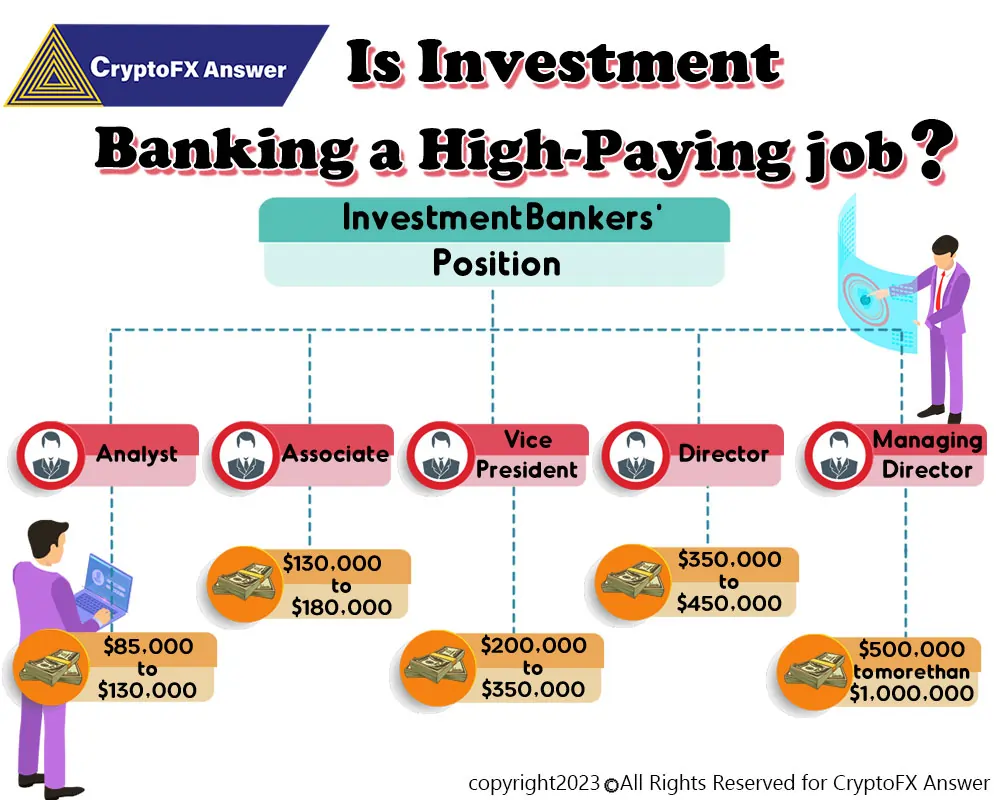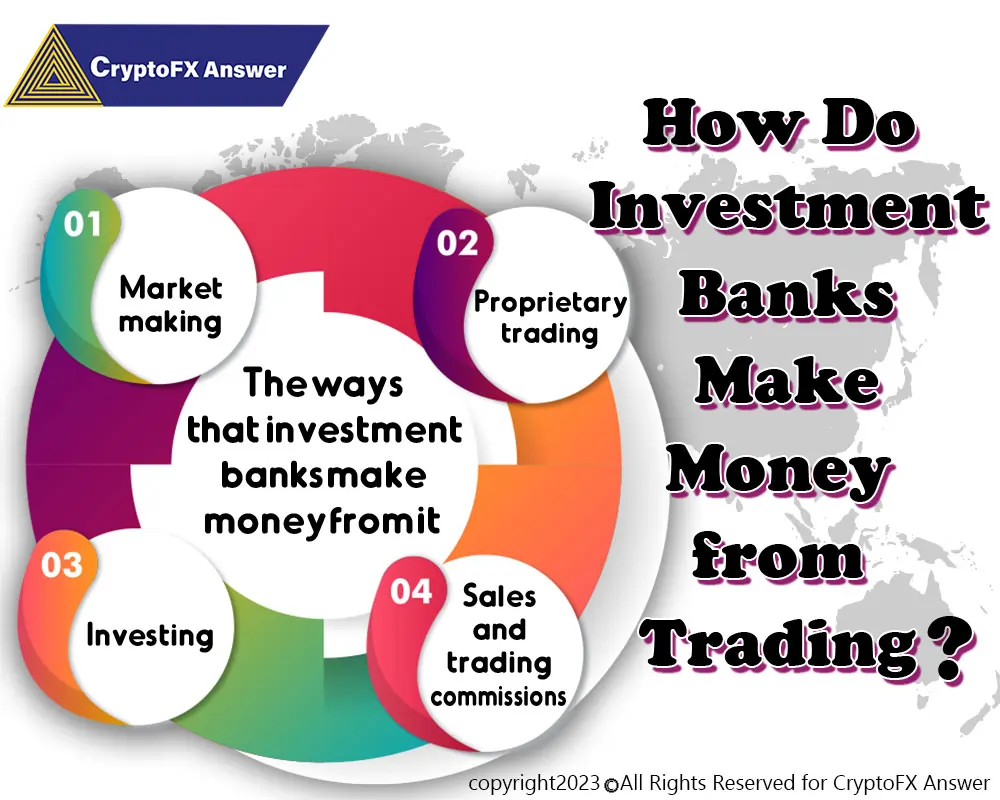Does investment bankers make a lot of money? Investment bankers are very smart, analytical, and have excellent communication skills.
This is not because of their personality; their job requires them to have these characteristics. So, whoever is working in investment banking should have such characteristics.
With all these explanations, do you know why do investment bankers make so much? In other words, do bankers make a lot of money?
These high intelligence people work more hours and under lots of pressure. Hence, they should be paid much more than some of the ordinary professions.
If you want to know if investment bankers make a lot of money and how much money they make, this article is going to answer all of the questions.
Prepare to enter a world where deals are worth billions, where the pressure to succeed is relentless. Prepare to get your answer to the question that has captivated the minds of financiers: Do investment bankers make millions?
Let’s find out!

Is Investment Banking a High-Paying Job?
If you are looking for a short answer, your answer is a solid yes! Investment banking is a high paying job, and it has so many logical reasons.
But the real question is how much money do investment bankers make that it is counted as a high-paying job?
The average annual income for an investment banker in the USA is almost $150,000; with incentives, the overall salary is up to $340,000. Nevertheless, compensation may differ greatly based on expertise level, business type, and region.
In the following section, we will divide all types of investment bankers (positions), with their level of profession, and then provide you with the income of each.
Based on data from current and previous years:
- Analyst 1: Base salary of $85,000 plus a variable bonus component, resulting in an overall compensation of approximately $135,000 for the first year in investment banking.
- Analyst 2: Midpoint compensation of approximately $160,000 for the second year.
- Analyst 3: Midpoint compensation of approximately $180,000 for the third year.
- Associate 1: $35,000 signing bonus, $125,000 base salary, and additional bonuses, resulting in an overall compensation of approximately $250,000.
- Associate 2: Midpoint compensation of approximately $300,000 for the second year, although I anticipate a decrease this year.
- Senior Associate: Compensation ranging from $300,000 to $450,000.
- VP1: Compensation ranging from $350,000 to $500,000, with a higher portion of compensation in the form of shares.
- VP2: Compensation ranging from $400,000 to $600,000.
- VP3: Compensation ranging from $450,000 to $700,000.
Directors & MD: Compensation varies significantly based on team, industry performance, revenue, and other factors. Compensation for Directors could start at $500,000 and reach several million dollars per year!
Look at the table below to access the gist of the information above:
Investment Bankers’ Position | Salaries |
Analyst | $85,000 to $130,000 |
Associate | $130,000 to $180,000 |
Vice President | $200,000 to $350,000 |
Director | $350,000 to $450,000 |
Managing Director | $500,000 to more than $1,000,000 |
How Much Do Investment Bankers Make Per Hour?
The investment bankers, based on their position and their level of expertise, can earn different amounts of money per hour: from $45 to more than $250.
Hourly wages of investment bankers increase with experience and position, and it depends on the company and the region.
These are the accessible data, and numbers might differ, but for your information, 10% of investment bankers can earn over $1 million per year. But here comes another question: how do investment banks make their money?

How Do Investment Banks Make Money from Trading?
Investment bankers can use lots of methods for making money; if you wonder how investment banks make money, we can exemplify how investment banks make money from trading.
The investment bankers can act as an intermediary between buyers and sellers of securities, and do market making.
Investment bankers can even use their capital to trade securities, taking on risks in order to generate profits. This type of trading can be very profitable, but it can also be very risky.
Look at the different types of trading that are listed below, which are the ways that investment banks make money from it:
- Market making
- Proprietary trading
- Investing
- Sales and trading commissions
Besides making money from trading, investment banks are highly specialized financial companies that offer a variety of services to businesses, governments, and other organizations.
They generate income through a range of channels, including mergers and acquisitions advising, insurance underwriting, securities investment, research, asset management, financing, and consulting services.
Is Investment Banking Worth It?
We acknowledge that these numbers and salaries are high enough to tempt everyone to think about becoming an investment banker! But you better know that this job is not for everyone.
Lots of people ask if investment banks make money or why they are getting high incomes. However, they fail to probe the underlying reasons for the substantial earnings of investment banking.
It is a very demanding career that requires long hours, hard work, and a lot of stress. If you are not prepared for the demands of this career, you may not be happy as an investment banker.
Providing clients with financial advice and telling them how to invest their money is not that easy in today’s world. It requires being updated 24/7 and never stop following the news and trends. This is only one of the investment banker’s tasks.
You ask if investment banking is worth it. Just envision yourself as a key player in high-stakes negotiations involving vast sums of money, where every decision is closely examined and could decide the FATE of the deal.
The clock is ticking, expectations are exceptionally high, and everyone is relying on you to perform under immense stress. This is the reality of investment banking, where pressure is constant, and the stakes are always high.
Now, you can decide if investment banking is worth it or not.
To manage these pressures, investment bankers must exhibit exceptional skills, unwavering dedication, and remarkable resilience.
They must be able to handle multiple tasks simultaneously, adapt to ever-changing market conditions, and maintain composure under intense scrutiny.
Only those who excel in challenging environments can survive and make a career out of this profession.
So, is it worth it to become an investment banker? That’s a question that each individual must answer for themselves.

For this purpose, at first, you should answer the questions below:
- Do you have the skills and experience that investment banks are looking for?
- Do you enjoy working in a fast-paced and demanding environment?
- Are you willing to work long hours and under pressure?
If you can answer all these questions, you will be able to decide whether to enter this profession. The final decision is yours only!
Curious to know more? Our article on “Does Investing Make You Rich?” dives into the details you don’t want to miss!
Bottom Line
In this section, we talked about investment bankers and whether they make a lot of money. And we saw the high amount of their income even per hour!
Now you know that investment bankers are known for their large salaries, and legitimately so. Their pay offers may be enormous, typically exceeding one million dollars for outstanding achievers.
However, you know that becoming an investment banker requires unshakable devotion, outstanding talents, and a willingness to accept the job’s demanding nature. Do you find yourself with these characteristics?
Are you willing to become an investment banker? If yes, please tell us your reasons.

